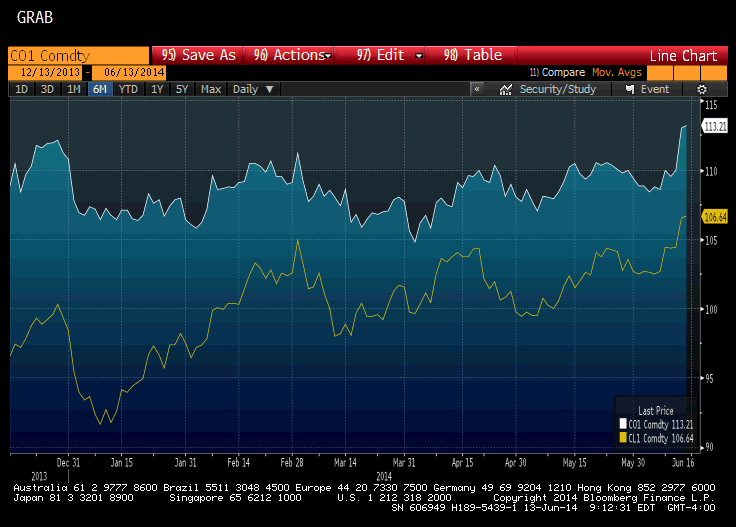The success of the insurgency in Iraq emerged last week as an important geopolitical development for investors and policy makers. Between Russia's action in Crimea and east Ukraine, and territorial disputes between China and several countries in the Asia, including Japan, the Philippines and Vietnam, and now Iraq, investors have had plenty to chew on. Nevertheless volatility throughout the capital markets remains low, even if off the recent floor. 
The developments in Iraq have sparked fears of supply disruptions and sent oil prices to nine month high and the biggest weekly advance of the year. This Great Graphic, created on Bloomberg, depicts the price of Brent (white line) and WTI (yellow line). The rise of WTI prices appears to be driven not just by the geopolitical concerns, but also the draw-down in inventories at Cushing terminals (where future contracts are delivered) as the earlier build has sent to refineries. This represents, in part a normalization that began in January.

Leaving aside the larger geopolitical issues of the conflict in Iraq/Syria, the economic implications of higher oil prices will likely be increasingly debated. Higher energy prices cannot be favorable for world growth. Regionally, Asia is more vulnerable than Latin America. Japan's inflation, stripped of the sales tax increase, has largely been a function of imported energy. Russia seems to be one of the beneficiaries of higher oil prices and (less) secure supplies. Russian shares were up over 2% this week, making the MICEX one of the best performing equity markets.
Some central banks may see the rise in oil prices as inflationary. In the past, the ECB has put much emphasis on headline inflation. Recall that under Trichet's leadership, the ECB hiked rates in the summer of 2008, as oil prices rallied, but as the euro zone sat on the precipice of a significant economic downturn. This is not a criticism with the benefit of hindsight, we argued it at the time as well.
Iraq produced around 3.3 mln barrels of oil a day in May. The bulk of its capacity is in the south. The insurgents are coming from the northeast. Some industry experts has suggested that if Iraqi output is taken off line, it may be worth $20-$30 a barrel for Brent.
The gains scored early in Friday's session have largely been reversed, with the front month contract off about $1.50 from the session highs, leaving it a few cents higher than yesterday. It looks like a some (prudent) profit-taking ahead of the weekend, which is likely to see the debate about a potential US military response (drones?). Given a host of political considerations, the course that the US government appears to be contemplating seems to be largely delay tactics-an attempt to frustrate and raise the cost to the insurgents, but not a strategy for victory.
Some central banks may see the rise in oil prices as inflationary. In the past, the ECB has put much emphasis on headline inflation. Recall that under Trichet's leadership, the ECB hiked rates in the summer of 2008, as oil prices rallied, but as the euro zone sat on the precipice of a significant economic downturn. This is not a criticism with the benefit of hindsight, we argued it at the time as well.
Iraq produced around 3.3 mln barrels of oil a day in May. The bulk of its capacity is in the south. The insurgents are coming from the northeast. Some industry experts has suggested that if Iraqi output is taken off line, it may be worth $20-$30 a barrel for Brent.
The gains scored early in Friday's session have largely been reversed, with the front month contract off about $1.50 from the session highs, leaving it a few cents higher than yesterday. It looks like a some (prudent) profit-taking ahead of the weekend, which is likely to see the debate about a potential US military response (drones?). Given a host of political considerations, the course that the US government appears to be contemplating seems to be largely delay tactics-an attempt to frustrate and raise the cost to the insurgents, but not a strategy for victory.
